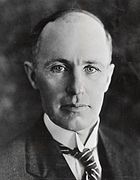Canadian federal election, 1926
|
|
||||||||||||||||||||||||||||||||||||||||||||||||||||||||||||||||||||
|---|---|---|---|---|---|---|---|---|---|---|---|---|---|---|---|---|---|---|---|---|---|---|---|---|---|---|---|---|---|---|---|---|---|---|---|---|---|---|---|---|---|---|---|---|---|---|---|---|---|---|---|---|---|---|---|---|---|---|---|---|---|---|---|---|---|---|---|---|
|
||||||||||||||||||||||||||||||||||||||||||||||||||||||||||||||||||||
|
|
||||||||||||||||||||||||||||||||||||||||||||||||||||||||||||||||||||
|
245 seats in the 16th Canadian Parliament 123 seats needed for a majority |
||||||||||||||||||||||||||||||||||||||||||||||||||||||||||||||||||||
|
||||||||||||||||||||||||||||||||||||||||||||||||||||||||||||||||||||

|
||||||||||||||||||||||||||||||||||||||||||||||||||||||||||||||||||||
|
||||||||||||||||||||||||||||||||||||||||||||||||||||||||||||||||||||
William Lyon Mackenzie King
Liberal
The Canadian federal election of 1926 was held on September 14 to elect members of the Canadian House of Commons of the 16th Parliament of Canada. The election was called following an event known as the King-Byng Affair. In the 1925 federal election, Prime Minister William Lyon Mackenzie King's Liberal Party of Canada won fewer seats in the Canadian House of Commons than the Conservative Party of Arthur Meighen. Mackenzie King, however, was determined to continue to govern with the support of the Progressive Party. The combined Liberal and Progressive caucuses gave Mackenzie King a plurality of seats in the House of Commons, and the ability to form a minority government. The agreement collapsed, however, following a scandal, and Mackenzie King approached the Governor-General, Baron Byng of Vimy, to seek dissolution of the Parliament. Byng refused on the basis that the Conservatives had won the largest number of seats in the prior election, and called upon Meighen to form a government.
Prime Minister Meighen's government was soon defeated in a vote of non-confidence, and Byng agreed to dissolve Parliament and call new elections. Mackenzie King effectively campaigned against Byng in the election instead of against Meighen, and won the largest number of seats in the House of Commons despite receiving a smaller proportion of the popular vote than the Tories. The Liberals did not run candidates in all ridings, having an informal electoral pact with the Progressives and Liberal-Progressives. Note in particular the election results in Manitoba, where Meighen's party captured almost 40 percent of the vote, twice the vote share of any other party, but no seats. Thus, Mackenzie King's Liberals were able to govern with the support of Liberal-Progressive Members of Parliament.
...
Wikipedia


